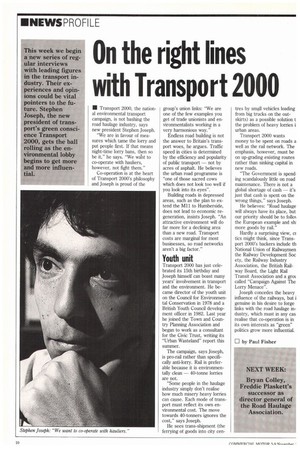On the right lines with Transport 2000
Page 10

If you've noticed an error in this article please click here to report it so we can fix it.
IN Transport 2000, the national environmental transport campaign, is not bashing the road haulage industry, says new president Stephen Joseph.
"We are in favour of measures which tame the lorry and put people first. If that means night-time lorry bans, then so be it," he says. "We want to co-operate with hauliers, however, not fight them."
Co-operation is at the heart of Transport 2000's philosophy and Joseph is proud of the group's union links: "We are one of the few examples you get of trade unionists and environmentalists working in a very harmonious way."
Endless road building is not the answer to Britain's transport woes, he argues. Traffic speed in cities is determined by the efficiency and popularity of public transport — not by acres of asphalt. He believes the urban road programme is "one of those sacred cows which does not look too well if you look into its eyes".
Building roads in depressed areas, such as the plan to extend the M1 1 to Humberside, does not lead to economic regeneration, insists Joseph. "An attractive environment will do far more for a declining area than a new road. Transport costs are marginal for most businesses, so road networks aren't a big factor."
Youth unit
Transport 2000 has just celebrated its 15th birthday and Joseph himself can boast many years' involvement in transport and the environment. He became director of the youth unit on the Council for Environmental Conservation in 1978 and a British Youth Council development officer in 1982. Last year he joined the Town and Country Planning Association and began to work as a consultant for the Civic Trust, writing its "Urban Wasteland" report this summer.
The campaign, says Joseph, is pro-rail rather than specifically anti-lorry. Rail is preferable because it is environmentally clean — 40-tonne lorries are not.
"Some people in the haulage industry simply don't realise how much misery heavy lorries can cause. Each mode of transport must reflect its own environmental cost. The move towards 40-tonners ignores the cost," says Joseph.
He sees trans-shipment (the ferrying ot goods into city cen tres by small vehicles loading from big trucks on the outskirts) as a possible solution t the problem of heavy lorries i urban areas.
Transport 2000 wants money to be spent on roads a well as the rail network. The emphasis, however, must be on up-grading existing routes rather than sinking capital in new roads.
"The Government is spend. ing scandalously little on road maintenance. There is not a global shortage of cash — it's just that cash is spent on the wrong things," says Joseph.
He believes: "Road haulage will always have its place, but our priority should be to follm the European example and sh more goods by rail."
Hardly a surprising view, ci tics might think, since Transport 2000's backers include th National Union of Railwaymen the Railway Development Soc ety, the Railway Industry Association, the British Railway Board, the Light Rail Transit Association and a groi called "Campaign Against The Lorry Menace".
Joseph concedes the heavy influence of the railways, but i genuine in his desire to forge links with the road haulage industry, which must in any cas realise that co-operation is in its own interests as "green" politics grow more influential.
CI by Paul Fisher
























































